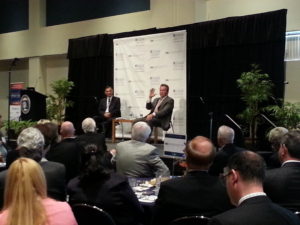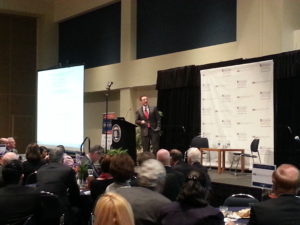

It turns out characters like Conan the Barbarian, the cyborg from Terminator and Dutch the protagonist in the original “Predator” movie, know a thing or two about risk.
Definitely the actor who portrayed them does.
Actor Arnold Schwarzenegger on Monday revisited a few of his more prolific characters and what it took the portray them for a group of insurance students and industry professionals as a Southern California university.
The former California governor also talked about the risks he took leaving his home country of Austria after a career as the world’s greatest body builder to try and make it big in Hollywood, and then his foray into politics.
His talk centered on risk was tailor-made for a conference titled “Insurance Industry Trends 2020 and Beyond” at Cal State University Fullerton. The event was staged by the administration and professors of the Center for Insurance Studies, which is part of the Mihaylo College of Business and Economics at Cal State University Fullerton.
Schwarzenegger was joined by Robert Hartwig, an economist and president of the Insurance Information Institute, who made what was likely his final stop in the region as the face of the property/casualty insurance industry.

Schwarzenegger focused much of his talk on delivering a message to students in the audience: they should pursue their dreams instead of settling for a career they may not really want.
When he was first trying to break into acting in the 1970s, Schwarzenegger’s brawny frame did not fit the star prototype in an era of rangier men like Al Pachino, and Woody Allen, who at the time was considered a “sex symbol.”
“My agent said Dustin Hoffman is hot and he only weighs 150 pounds,” Schwarzenegger said.
Driven by dreams first formed through viewing 8 mm films as a boy in his homeland, he ignored the advice of his agent and pursued numerous roles in films.
“You can’t be concerned about failure,” he said.
Not of all of Schwarzenegger’s films turned out to be blockbusters, such as the embarrassing 1970 dud “Hercules in New York,” which the former muscle-man didn’t mind poking fun of.
“It was a disaster,” he said. “It went into the toilet.”
Following that failure he landed the role of Conan the Barbarian. The film of the same name was a resounding success – in fact Schwarzenegger is set to appear in the yet-to-be-released “Legend of Conan.”
A lion’s share of his speech took on a “get up, don’t stay down” theme, a mindset he said carried him from body building, to acting, to his time as “the Governator.”
As California governor from 2003 to 2011, the Republican was noted for his crusade against partisanship, particularly in a state dominated by Democrats.
“Let me tell you, it is quite a surprise when you get in there and you see that everything is political,” he said.
Schwarzenegger described fighting with both parties on topics like schools, infrastructure and the environment.
And those battles often made little sense to him.
“There is no Democrat air or Republican air. The air is polluted,” he said, backing up his anti-pollution stance with the World Health Organization statistic that 7 million people per year in the U.S. die as a result of air pollution exposure.

His topics, largely retrospective on the success he had during his years as governor, included political reform, such as fighting against gerrymandering as well as supporting open primaries, workers’ compensation reform, afterschool programs, equal education and climate change.
Despite his pro-business, conservative bent, Schwarzenegger has embraced a number of pro-environment movements, particularly climate change.
He was decidedly approving when asked about the Paris agreement hammered out by world leaders last year to battle climate change, called the COP21.
“I think it’s good to have a goal,” he said. “It’s a good agreement. It’s not perfect by any means.”
He again pointed to his time as California governor and noted that the state had early in the Millennium started being proactive on reducing greenhouse gases with an initiative that became law in 2006 after opponents battled it all the way up to the high court.
“They told us they could not regulate our own air,” Schwarzenegger said.
He scoffed at the opposition’s argument at the time that greenhouse gas is not a pollutant.
Echoing an earlier comment, he put in: “Seven million people die every year because of pollution.”
He took time to answer a few questions from students and other members of the audience. One student asked him about his new role on NBC’s “Celebrity Apprentice,” and if he would come up with a catch phrase like presidential hopeful and show predecessor Donald Trump’s, “You’re fired.”
“You’re terminated” was one suggested move tie-in he may consider working into the show, the student said, to which Schwarzenegger offered another: “Get to the chopper.”
The famous line from “Predator” drew roaring laughter from an audience that had largely been quiet until that point.
Of Schwarzenegger’s few regrets, one is that he is a foreign-born citizen and therefore constitutionally prohibited for attaining the nation’s highest office.
“I do regret that I wasn’t born in America,” he said.
The event was possibly the final chance for people in Southern California to hear from the man who has been the face of insurance industry since 2007. Hartwig in February announced he is leaving the helm of I.I.I this summer to join the faculty of the University of South Carolina’s Darla Moore School of Business.
Hartwig travels throughout the U.S. sharing facts and figures on the insurance industry at a rapid pace, as he points audience members to a blur of overhead slides to back up his assertions.
Within an hour he covered a large array of topics: changing market dynamics; net premiums written across the U.S.; cyber insurance; the gig economy; worker’s compensation; disruptors; auto insurance; autonomous vehicles; and technology.
“This is an industry going through a tremendous period of technological change,” Hartwig said.
And with each of those changes, there’s no shortage of people trying to write off the insurance industry, such as the lingering prediction from myriad worrywarts that autonomous vehicles will kill off auto insurance, he added.
Among his legion of slides was one showing that by 2035 it’s estimated that 25 percent of new vehicles coming off production lines will be fully autonomous.
He also noted that while Google’s driverless car is making headlines, it couldn’t make the short trip today from the train station to his home without “ending up in a ditch.”
“We are a long way off on this stuff,” he said.
Instead of succumbing to technology, the insurance industry has adapted by providing new products for ridesharing, property sharing and cyber-attacks, he added.
Hartwig also dismissed the notion that technology companies will supplant insurers and insurance agents with disruptive innovations like online insurance shopping portals and software-enhanced aggregators.
“There’s a lot of Silicon Valley hype nowadays,” Hartwig said.
The event also included a panel discussion with Chris Baggaley, senior vice president at the Automobile Club of Southern California, Ron Guerrier, chief information officer of Farmers Insurance Group, Mark Costa, senior vice president at Kaiser Permanente, and Joe Celentano, senior vice president at Pacific Life Insurance Co.
Proceeds went to benefit the center’s insurance marketing entrepreneurship program endowment, which provides funding for students interested in careers on the sales side of risk management and insurance.
Related: